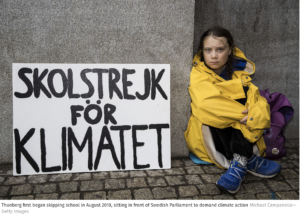Strong evidence that every day’s delay in reducing greenhouse gas emissions makes the ultimate task more difficult (and less achievable; exploding the myth that natural gas is a safe, low emissions transition fuel to a carbon free world; hoped-for outcomes from the current COP meeting in Madrid; some Christmas suggestions; and a visual tribute to a genuine hero of 2019. Happy Christmas and let’s hope 2020 sees progress towards the creation of an environmentally sustainable world.
The 2019 Emissions Gap Report produced by the United Nations has received considerable coverage in the general media, including in P&I. The depth of the problem is illustrated by the text as much as the numbers: ‘the findings are bleak’, ‘countries collectively failed to stop the growth in GHG emissions [which] have risen at a rate of 1.5 per cent per year in the last decade’, ‘no sign of GHG emissions peaking in the next few years’, ‘deeper and faster cuts are now required’, ‘incremental changes will not be enough and there is a need for rapid and transformational action’, ‘countries must increase their NDCs (Nationally Determined Contributions) 3-5-fold in 2020’, and ‘climate protection and adaptation investments will become a precondition for peace and stability’.
One piece of data that has received little attention highlights the short-sighted and financially costly stupidity of governments. Had governments started acting on the science in 2009, emissions reductions of 3.3% per year would have given us a reasonable chance of keeping warming under 1.5oC. Action starting now requires reductions of 7.6% per year. Delaying action until 2025 will require cuts of 15.5% per year. Every day we delay matters. But let’s be honest, with emissions rising for the foreseeable future and little likelihood of the global community being determined enough to reduce emissions by 15% per year only 6 years from now, we should probably stop perpetuating the 1.5oC myth.
One major reason for the continuing increase in greenhouse gas emissions is the growth in the burning of gas, production of which is rocketing in the USA and Australia. Gas is often promoted by producers seeking profits and governments seeking jobs and revenue as a lower emissions transition fuel between coal and renewables. There are three problems with this. First, gas is not currently replacing coal, it is supplementing it as energy demand increases. Second, when emissions across the whole life cycles of the production, transport and burning of coal and gas are compared, gas is no better than coal. Third, gas has serious health and environmental hazards of its own.
By the time you read this, Madrid’s COP meeting will be all over. Next year’s meeting will be in Glasgow and will be extremely important because it’s when each of the 200 countries that are the ‘Parties’ to the Conference is due to increase its commitments to reduce greenhouse gas emissions – increased commitments that are sorely needed. So what outcomes might we look for from the Madrid meeting to help make Glasgow a success:
- Commitments by all governments to declare by the middle of 2020 ambitious (i.e. guided by science and the still theoretically achievable 1.5oC goal) NDCs that include targets, milestones and strategies to reduce their national emissions so that a synthesis report of the combined commitments is available to inform the Glasgow meeting;
- Agreement on common time frames for presenting and measuring emissions reductions targets – e.g. 75% reduction by 2035 compared with 2005;
- An international carbon market system (that controls the trading of greenhouse gas emissions units between nations) that is effective, transparent, avoids double counting of emissions reductions, and doesn’t inflict burdens or suffering on Indigenous and disadvantaged communities;
- Agreement that expired Kyoto agreement credits will not be carried over beyond 2020. Australia is behaving particularly badly on this one;
- Commitments by rich nations to fully fund the Green Climate Fund to help poorer nations mitigate emissions and adapt to climate change. Again, Australia is behaving badly here;
- Acknowledgement by rich developed nations of the severe loss and damage already being suffered by developing poorer nations as a result of climate change and the need to provide financial assistance to help nations cope.
This may all seem rather arcane and beyond our day to day lives but although I have little faith in the COP process or the Paris Agreement the simple fact is that at present they are the only tools in the shed for avoiding catastrophic climate change.
If you are thinking of buying some new Christmas lights remember that LED lights use up to 80% less power, are eco-friendly, cooler, safer, and last 10-50X longer. You can save even more power by putting them on a timer so that they aren’t blazing away unappreciated all through the small hours, and by hanging highly reflective ornaments and mirrors nearby to achieve a similar stunning effect with fewer lights. Outside, this is also better for the night’s insects, birds and bats.
Talking of insects, climate change, habitat loss and insecticides are wreaking havoc on their numbers. Here are five tips to help them survive: grow flower-rich plants, create insect sanctuaries, eat organic food, turn off outside lights and go green in your garden. If you’re looking for a last minute Christmas present for someone, why not give them something that is good for our insects.
The Sunday environmental round up will be taking a break for three weeks, back on January 12th. The best way I can finish 2019 is with these visual tributes to Greta Thunberg. Just 15 months separate the two photos.
Peter Sainsbury is a retired public health worker with a long interest in social policy, particularly social justice, and now focusing on climate change and environmental sustainability. He is extremely pessimistic about the world avoiding catastrophic global warming.



Comments
7 responses to “Sunday environmental round-up, 15 December 2019”
PS The recent protest trip you and other health professionals made to the Adani mine construction site was worthwhile.
Let’s hope Fed & State Govts can’t change environmental laws to allow mining.
We need to do more than hope and pray.
Cheers, Con
Hi Peter,
Thanks for your environment roundups each Sunday. I’ve looked forward to your insights.
Have a well earned break.
Regards, Con
Thanks for your very important analysis showing that a gas transition is a non-solution.
There is one thing that you said however that I’m afraid I don’t agree with: “But let’s be honest, with emissions rising for the foreseeable future and little likelihood of the global community being determined enough to reduce emissions by 15% per year only 6 years from now, we should probably stop perpetuating the 1.5°C myth.”
We must not give up on protecting people and other species. A +1.5°C goal is no longer appropriate, but not because it is too low but because it is too high! See what catastrophic damage is being done now at 1.1°C and what horrifying tipping points are being flipped now.
The challenge for us all now is to work out how to get societies across the world into emergency mode very soon to implement a cold turkey abandonment of fossil fuels and other emitting technologies And we will have to complement this with the simultaneous creation of a massive CO2 drawdown industry and we will have to see if we can find safe-enough ways to apply temporary near term cooling via solar reflection methods.
Realism at this late stage mustn’t take the form of lowering expectations, but rather of realising that we must tackle and achieve an ever more astonishing level of physical change.
As the US was contemplating entry into WW2, the US military was following the doctrine of hemispheric defence – ie. leaving Europe to the Nazis and Asia to the imperialist military regime in Japan and only trying to defend the US sphere of influence in North and South America. Fortunately Roosevelt rejected this limited goal and committed the US to the pursuit of unconditional surrender of the aggressors globally.
We now face the same sort of choice in deciding whether to give up on trying to protect all people and all species given how hard this is fast becoming or whether we should redouble our commitment to protection and then find extraordinary ways to deliver that protection.
Arrhenius’ major publication on the Greenhouse effect was in 1896. Enough work has been done to quantify it. Acting on it is overdue by at least half a century. The rule of Science is also long overdue. With current lawmaking institutions in their death throes, it might come at last.
There cannot, any more, be anything good to be read about climate change. Sometimes I wonder why I continue to do the reading … But I do at least continue to do the caring.
Greta – what a truly extraordinary young woman !
Peter have a great break you will need it having kept us so informed about climate change and environmental issues in the true tradition of public health. The photos of Greta Thunberg tell us about our duty to the future and our children.
Couldn’t agree more with all this. Just the same as the late Prof Alf Bartlett said “we humans do not understand the Exponential Equation” This fact is behind our negligence . We evolved to address immediate threats to survive. We didn’t evolve to forecast the unforseeable future. So now we can know roughly what needs to be done, but we cannot get a good result in time. We’ll panic only when we see the whites of its eyes.